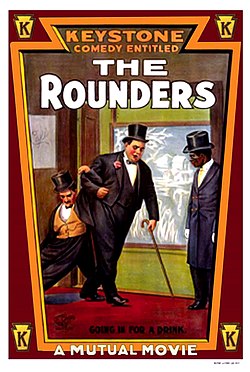| The Rounders | |
|---|---|
 Theatrical poster | |
| Directed by | Charlie Chaplin |
| Written by | Charlie Chaplin |
| Produced by | Mack Sennett |
| Starring | Charlie Chaplin Roscoe Arbuckle |
| Cinematography | Frank D. Williams |
| Edited by | Charlie Chaplin |
Production company | |
| Distributed by | Mutual Film |
Release date |
|
Running time | 16 minutes |
| Country | United States |
| Languages | Silent film English intertitles |
The Rounders is a 1914 comedy short starring Charlie Chaplin and Roscoe Arbuckle. [1] The film involves two drunks who get into trouble with their wives, and was written and directed by Chaplin.
